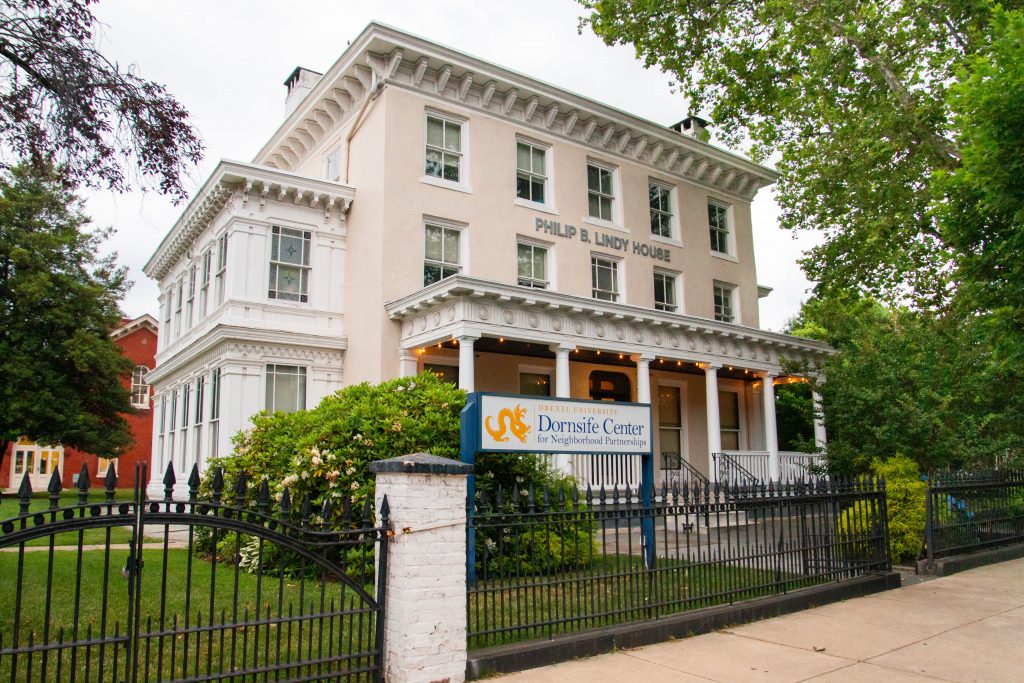
Drexel University’s CNHP Community Wellness Heal Unite Bridge, located in the Dornsife Center for Neighborhood Partnerships, created in 2017, is a center dedicated to addressing the social determinants and community factors that impact the health of residents in Mantua, Powelton Village and beyond.
The HUB differentiates itself from other clinics and programs through its focus on preventative care, initiating programming and initiatives that work together with the community to improve the quality of life, health and health outcomes of residents in these regions. The HUB focuses on seven main areas: chronic conditions, access to nutrition and healthy foods, access to physical fitness, behavioral/mental health, sexual/reproductive health, environmental health and access to healthcare. The HUB is staffed by an interdisciplinary combination of volunteers from Drexel University and licensed healthcare professionals from a variety of backgrounds.
Executive Director of the Community Wellness HUB Monica Harmon is a public health nurse, researcher and educator who focuses on the many social and cultural determinants of health that can lead to disease. Harmon emphasized the significance of establishing the HUB, specifically through the Dornsife Center.
“There was a community conversation and community members [in the areas of Powelton Village and Mantua] said we don’t have anywhere for help in our community.”
She described how residents of Mantua must walk through multiple neighborhoods to access healthcare at the nearest hospital, Penn Presbyterian. This, she indicated, has a serious impact on the health and wellness of community members in those areas. The HUB aims to bridge that gap in health needs and services available. HUB programming includes pop-ups and chats with health professionals, among other services.
A few years after its establishment in 2017, Dana Dornsife, founder and Chief Mission and Strategy Officer for Lazarex Cancer Foundation, became interested in this HUB and decided to utilize the resources of her foundation to establish a cancer wellness HUB to widen the distribution of resources for patients and families dealing with cancer. This HUB program provides information about cancer, how to navigate the complicated healthcare system as a cancer patient and most importantly it connects people to others in the neighborhood who have been diagnosed with cancer.
“I can’t tell you in how many meetings, people talk about themselves having breast cancer or their father having prostate cancer. Some people say, oh my goodness, this is what I felt and this is what I did. It’s also letting people know that they aren’t alone,” said Harmon.
The HUB aims to recognize the trauma that occurs in the neighborhoods that the University of Pennsylvania and Drexel touch and the effects that creation of University City had on individuals already located in those areas. Structural racism makes it necessary for HUB volunteers and employees to both gain trust and be a true partner of community members.
“Many times, the researchers and students from the surrounding institutions ask questions and gain information from the community members, who frequently say they never hear back from them again. I am very clear on making this mutually beneficial partnership,” emphasized Harmon.
HUB prioritizes the return of any information obtained from the community members to the community as a resource, and strives to listen to the community voice.
A HUB initiative last year was designed to listen to the voices of both men and women through two community conversation events. The health needs of the two groups are different, and historically, men have been less willing to open up about their health concerns. These conversations, intended to make people feel heard and cared for, facilitated many connections between community members.
Harmon in particular, has a unique insight into both the inner workings of the Drexel administration, which she describes carries a reputation for “always taking,” and as someone educated by Drexel, having attended summer enrichment programs and after school programs provided by University City.
“You have to have a head and a heart for this work,” said Harmon, echoing the thoughts of many community members who have been impacted by the HUB.
“You have to take the words and spirits of community members who have never, ever been asked to be at the table. So it becomes who else is not giving their input and how do you get them to?”
Harmon emphasized the importance of student and faculty involvement with the HUB. Harmon went on to describe the HUB as an interdisciplinary organization, accepting students and volunteers from a variety of health and non health majors, interests and passions.
“There is room for all of us. All of our skills are necessary. The community members are experts but we may have some skills that community members may not understand. I want students to have some sort of community interactions during their time in school.”
Harmon also heads an interprofessional class through the Honors College: HNRS I380, which has taught students who specialize in chemistry, computer engineering, public health and nursing, among others. She emphasized the diversity of thought, experiences and knowledge, which when brought together yielded productive and impactful conversations — the exact conversations the HUB aims to facilitate with the community.


